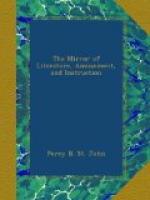[Footnote 1] In a few words, the Amulet reached us in an early stage of convalescence, when we began to feel that “no medicine is better for the weakness of the body than that which soothes and tranquillizes the soul.” We are not suiting the action to the word; on the contrary, we would desire to wear such truths as the Amulet enjoins—in our “heart of hearts,” as well in returning health and vigour as in the above moments.
The present volume contains Fourteen Plates, among which are Murillo’s Spanish Flower Girl; Etty’s Guardian Angels, by Finden; a copy of Sir Thomas Lawrence’s portrait of Lady Georgiana Fane, from Colnaghi’s print; Eastlake’s Italian Mother; one of Collins’s last pictures, The Fisherman Leaving Home; The Temple of Victory, from Gandy,—all which are first-rate works of art.
There are eighty contributions, as the bookmakers say, “in prose and verse,” with a predominance of the former. The first of the prose is a Strange Story of every day, by William Kennedy—well told, but too long for extract. The Mountain Daisy, a village sketch, by the Editor’s lady, is gracefully written; and with the Fisherman, by the Editor, is a fair characteristic of the amiable spirit to which we have already alluded; and in the same tone of good feeling is the Rose of Fennock Dale, a true story by the fair authoress of the Mountain Daisy; and the Wandering Minstrels, by the Rev. F.A. Cox, L.L.D. Miss Mitford has contributed one of her inimitable sketches, Little Moses; but the most staple articles in the volume are The Battle of Bunaania, one of the Georgian Islands, by Mr. Ellis, the missionary; Notices of the Canadian Indians, by Dr. Walsh; a Journey over the Brocken, by Mr. Coleridge; and a Fragment, by Miss Jane Porter. Our prose selection is from the last of these articles; but we intend transferring a portion of Dr. Walsh’s “Notices” to our next “Manners and Customs.”
* * * * *
THE SOUTH SEA CHIEF.
By Miss Jane Porter.
While in the north of Europe, I met with a rather extraordinary person, whose account of himself might afford a subject for a pretty romance; a sort of new Paul and Virginia; but with what different catastrophe, it is not fair to presage. He described himself as a Frenchman, a native of Bourdeaux; where, at an early age, he was put on board a merchant ship, to learn the profession of a seaman. About that time war broke out between Great Britain, and the lately proclaimed Republic of France; and the vessel he was in, being attacked, and taken by an English man-of-war, he was carried a prisoner into England. When there, his naturally enterprising character would not submit itself to a state of captivity; and, soon making his wishes understood, he entered on board a British sloop, bound to New Holland. While gazing with rapt astonishment




